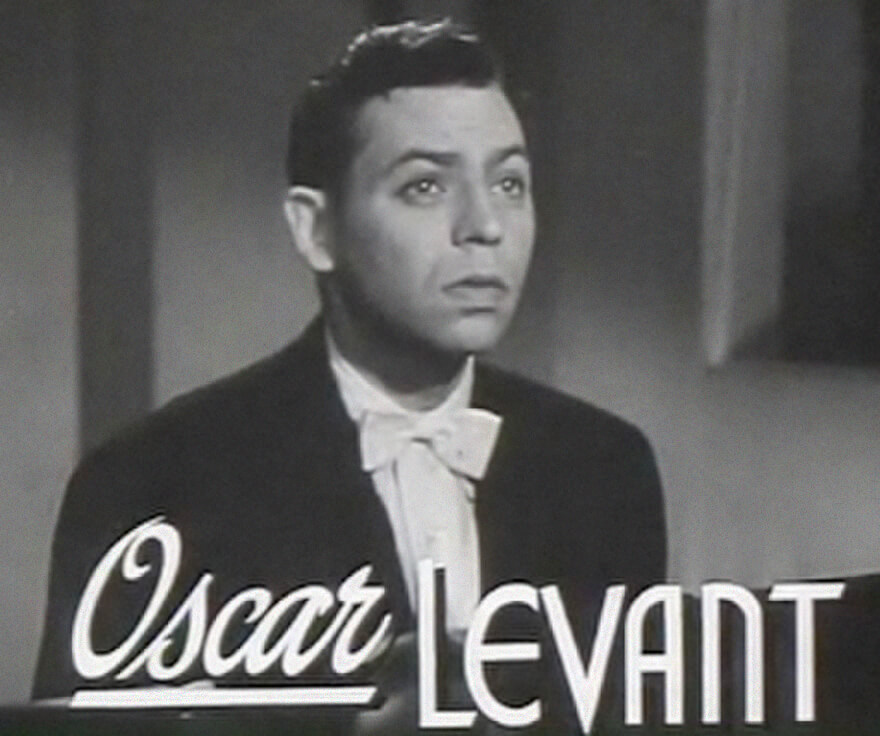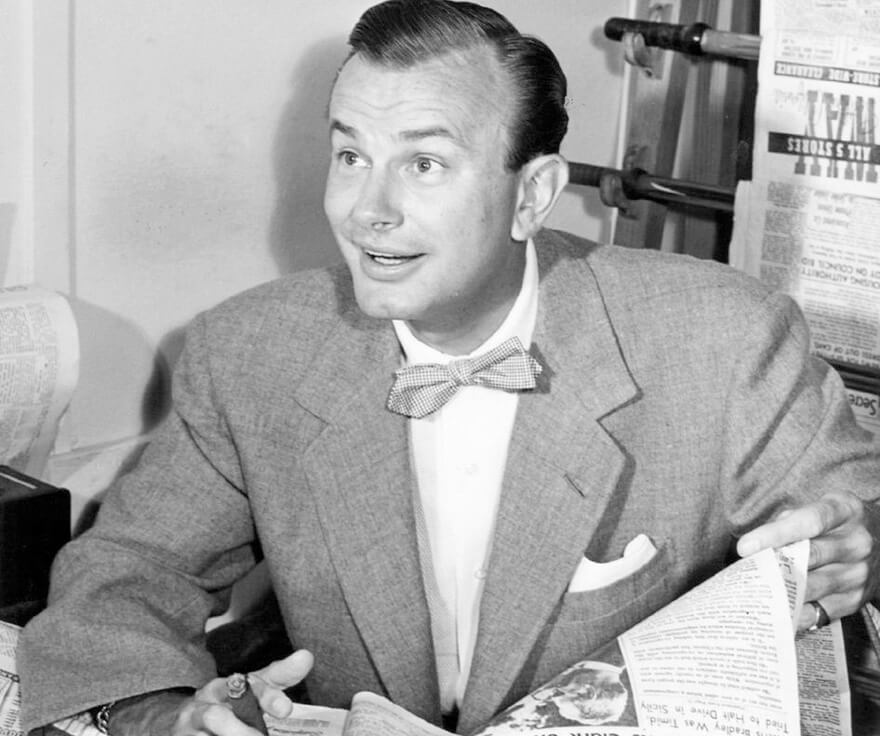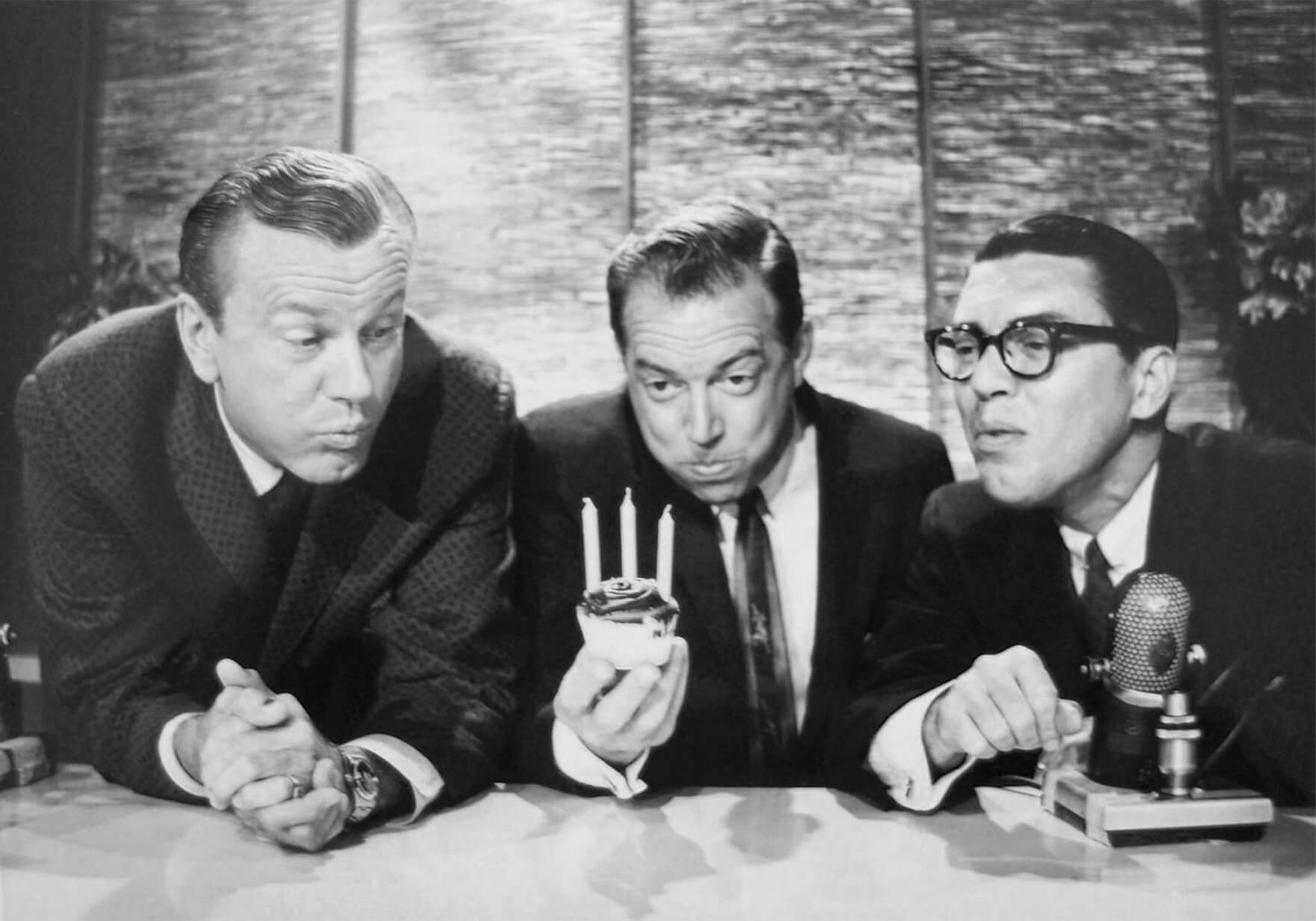History
Oscar Levant, a Man of Many Mediums
by Neena Arndt
“I played an unsympathetic part—myself,” quipped Oscar Levant in a 1946 interview about his role in Humoresque, a film in which he portrayed an accompanist and sidekick. But contrary to his comment, Levant’s fans always found him sympathetic as he built an eclectic career as a conductor, composer, concert pianist, actor, author, radio game show panelist and television game show host. Born in 1906 when radio and film were in their infancy, Levant expertly traversed new media gaining popularity for both his world-class piano playing and his incisive—and often self-deprecating—wit.
Originally from Pittsburgh, Levant was born to Max and Annie Levant, Orthodox Jews who had emigrated from Russia. He moved to New York at age 15 to study piano under Zygmunt Stojowski, a Polish composer and teacher. In addition to attending classical concerts, Levant also frequented nightclubs, where he developed a taste for popular music. In 1925, he appeared in Ben Bernie and All the Lads, a short film made with then-new technology that recorded sound and film together. For an audience accustomed to silent films, the movie—which consists of a group of men playing a medley of songs, with 19-year-old Levant at the piano—represented an exciting technological advance. Perhaps entranced by this new medium, Levant moved to Hollywood a few years later, where he quickly impressed and befriended George Gershwin and found work in films playing the piano and, later, composing and appearing as an actor. Still, he maintained an interest in classical work, and one of his compositions caught the ear of Aaron Copland, who invited him to perform it at a festival in 1932.
Throughout the 1930s, Levant maintained a delicate balance between Hollywood, Broadway and classical composition. Upon George Gershwin’s death in 1937, critics and audiences considered him the leading interpreter of Gershwin’s music, a role that Levant took on as both an honor and a chore for the next two decades. In his memoir A Smattering of Ignorance, Levant later noted that the first time he had heard Gershwin play the piano, he felt the first stirrings of “the two characteristics I have nurtured ever since as the dominating influences of my life—jealousy and revenge.” Though Levant’s words can be interpreted as a joke, he likely felt overshadowed by the enormity of Gershwin’s fame and talent. Carrying the Gershwin torch must have been a burden.
Fortunately, Levant’s career didn’t stall. Throughout the late 1920s and early 1930s, Americans had bought radios en masse, and for the first time in human history, voices and music could be broadcast live into living rooms. Levant began appearing regularly on the radio in 1938, but surprisingly, he didn’t usually play music. Rather, he appeared as a panelist on Information Please, a radio quiz show on which listeners sent in questions to try to stump the panelists; if they succeeded, they won a cash prize. Levant impressed viewers with his knowledge of music, but he also regaled them with his witty repartee; he often buried cruel truths within jokes. For the first time, he had a large audience for his wisecracks, which he later continued to showcase through television and memoirs. “I think a lot of Bernstein—but not as much as he does,” Levant quipped about the famous composer. “I knew Doris Day before she was a virgin,” he remarked about the famously innocent-seeming songstress. Levant knew many people in Hollywood, and he used his fame to discuss and dissect stars, becoming a de facto cultural commentator. Ironically, his success also led to more appearances as a concert pianist, since promoters booked him on the assumption that audiences would want to hear the famous quiz show man play the piano.
From the late 1940s to the early 1950s, Levant enjoyed major supporting roles in a string of successful movies: The Barkleys of Broadway, starring Gingers Rogers and Fred Astaire; An American in Paris, starring Gene Kelly; and The Band Wagon, starring Astaire and Cyd Charisse. In these boisterous musical films, Levant more or less plays himself: a slightly acerbic pianist or composer. Frequently seated at the piano, he provides some of the accompaniment that the musicals’ songs require, and sings smaller parts. In An American in Paris, Levant plays Gershwin’s Concerto in F Major in a dream sequence that diverges from the movie’s plot for the sole purpose of showcasing his virtuosity. In one of The Band Wagon‘s most famous musical numbers, “That’s Entertainment!”, there is no piano to be seen, and Levant gamely (if a bit awkwardly) performs choreography alongside legendary dancer Fred Astaire.
Levant’s upbeat performance in The Band Wagon belied his failing health. A year before the film’s release, in 1952, he had suffered a heart attack. After receiving treatment with Demerol, Levant soon developed an addiction to the narcotic. From this point on, he faced professional difficulties, and his faithful wife, June, shuttled him between mental hospitals, professional engagements and rest at home. Despite his struggles, Levant had one more medium to conquer: the small screen. He appeared as a panelist on the NBC game show Who Said That?, and hosted his own television show from 1958 to 1960. On The Oscar Levant Show, which appeared on KCOP-TV in Los Angeles, he played the piano and interviewed guests including Fred Astaire and Linus Pauling. Levant was also a frequent guest on talk shows, including The Tonight Show.
By the 1960s, Levant made few appearances. But during this period he wrote two of his three memoirs: The Memoirs of an Amnesiac and The Unimportance of Being Oscar. That title, a pun on Oscar Wilde’s play The Importance of Being Earnest, indicates how Levant thought of himself: he’d spent his life not being George Gershwin. But he’d done something Gershwin hadn’t: he reinvented himself repeatedly as new technologies offered different ways of reaching audiences. Today, he might be playing the piano on TikTok—or avidly seeking the next app.
Neena Arndt is the Resident Dramaturg for Goodman Theatre.


And Now, a Word From Our Sponsor
In the post-war years, there was nothing quite so American as TV
by Thomas Connors
Beatniks were popping up everywhere. The Blob was on the big screen. And in suburban backyards, hips were getting a workout with the latest sensation: the Hula Hoop. Television, which began giving radio a run for its money in the late 1940s, had become a staple in more than half of America’s homes. By day, housewives put down their Mr. Clean to catch The Guiding Light before the kids returned from school and commandeered the set to watch The Mickey Mouse Club. Come evening, the whole family might grab a Swanson TV Dinner (introduced in 1953) and gather around to enjoy the latest episode of Gunsmoke.
Basking in the glow of a cathode ray tube was America’s newest pastime, but not everyone was having it. On October 15, 1958, journalist Edward R. Murrow (whose Emmy-winning news magazine, See It Now, aired on CBS) delivered a speech before the Radio and Television News Directors Association in Chicago, urging the industry to “teach,” “illuminate” and “inspire” rather than “distract, delude, amuse.” The following year, UPI TV critic William Ewald went after viewers, declaring, “If you prefer to squander your free time on Lawrence Welk, The Texan, The Price is Right and other drivel, it may be time to question your values.”
While it’s easy to look back at the shows of the day and see that era as a simple and simpleminded time, there was more to television programming than Leave It to Beaver. Then as now, viewers keen on current events could tune in to both Meet the Press and Face the Nation. Those with a taste for something other than westerns and sitcoms might check out the generally more elevated fare of Hallmark Hall of Fame. And although talk shows—pioneered by Steve Allen as host of The Tonight Show—were showbiz-driven entertainments light years from the likes of David Susskind and Dick Cavett, some weren’t above welcoming guests who didn’t have a film to plug.
Oscar Levant, the high school dropout who studied with Arnold Schoenberg and was no slouch himself in the serious music department, found fame in Hollywood, most notably as Adam Cook, pal to Gene Kelly’s Jerry Mulligan in An American in Paris. In the ’50s, he hosted an eponymous local talk show in Los Angeles, chatting up in his witty and sometimes off-the-rail way such less-than-usual suspects as U.S. Supreme Court Justice William O. Douglas and writers Aldous Huxley and Christopher Isherwood.
Jack Paar, who succeeded Steve Allen on The Tonight Show, didn’t steer clear of stars and celebrities. But as a man who liked serious conversation (and some might say, the sound of his own voice), he also sat down with Billy Graham, Richard Nixon and William F. Buckley Jr.—and went on the road to interview Fidel Castro in Cuba and Albert Schweitzer in Africa. Like Levant, Paar wore his heart on his sleeve and wasn’t always comfortable on camera. He even walked off his own show when he learned the censors had cut some of his material. “I’m complicated, sentimental, lovable, honest, loyal, decent, generous, likable and lonely,” he once admitted. “My personality is not split, it’s shredded.” Levant—who was quite open about his psychic struggles—was Paar’s guest on more than one occasion. Both men were quick wits and great storytellers and their encounters—especially when the self-deprecating Levant recounted his mental breakdowns and shock treatment—offered television audiences something they weren’t expecting. “There is a fine line between genius and insanity,” Levant said. “I have erased that line.”
Thomas Connors is a Chicago-based freelance writer and the Chicago editor of Playbill.

One of America’s Most Popular Indoor Pastimes
by Caroline Uy
Over time, The Tonight Show hosts—Johnny Carson, Jay Leno, Conan O’Brien, Jimmy Fallon—have become household names, their self-titled programs popping up in TV guides and while channel-surfing. But the tradition of titling the show after the host began with one man: Jack Paar.
Before Paar, The Tonight Show was simply known as Tonight, but with his runaway popularity, NBC began airing the show as Tonight Starring Jack Paar and even simply as The Jack Paar Show. Paar didn’t walk in with huge celebrity cachet—his previous gigs included working as an announcer and disc jockey for Midwest radio stations, hosting game shows and morning talk shows, and a couple of film credits. He didn’t revolutionize the medium. By his 1957-1962 run, most of the talk show format had been established by his predecessors and contemporaries. What Paar brought was an uncanny ear for conversation, a balance of intuition and irreverence, and a touch of his own neurotic vulnerability and unpredictability. Paar’s Tonight Show cut down on the skits and games in favor of emphasizing the opening monologue and guest conversations. In addition to Oscar Levant, Paar hosted Cliff Arquette, Betty White, Richard Nixon, Muhammad Ali and Liberace, focusing more on colorful personality and interesting stories than on “stars” with movies to push or any particular career, with actors, comedians, and entertainment tycoons playing right alongside scientists, professors and authors. His conversations were frank, unscripted and often underprepared, elevating them beyond a generic chat. Paar was also known for his emotional and mercurial nature, unafraid of pushing the envelope or inviting scandal. Among his more controversial episodes include an on-site interview with Fidel Castro and a broadcast from Berlin during the construction of the Berlin Wall. In 1960, after NBC censored one of his jokes the night before, Paar even resigned on-air, walking off the show about four minutes into the broadcast with the remark, “There must be a better way of making a living than this.” He didn’t return until three weeks later, after an apology from the executives. With a penchant for self-revealing stories, witticisms and unpredictable character, Paar kept late-night America tuned in to their TV screens, nervous and excited. In a 2004 tribute to Paar on Larry King Live, comedian Bob Newhart perhaps characterized it best: “You couldn’t afford to miss [The Jack Paar Show], because you never knew what was going to happen.”
Caroline Uy is the Literary/Dramaturgy Apprentice for Goodman Theatre.